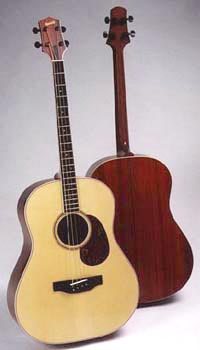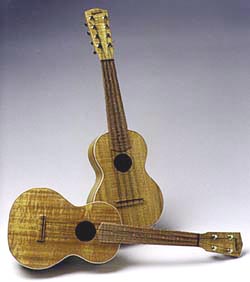
The company name listed on the home page of Joel Eckhaus’ web site is “Earnest Uncommon Musical Instruments.” Delve further and you will find that the man behind the site, and his life story, are equally odd. It’s the tale of someone who has sought uncommon activities, made unusual items, and learned from people with unlikely names.
Joel, who, at 53, is married to a nurse and living in Maine, was originally raised in White Plains, New York. Along the way, he lived in Connecticut, New Orleans, and Vermont, and has worked as a musician, teacher, school bus driver, camp counselor, and taxi driver, to name just a few of his many jobs. His core work, though, has always been as a musician and woodworker, two fields he conveniently combines in Earnest, a company making non-mainstream musical instruments.
His woodworking career began in 1972 when he took a course at Shelburne Craft School in Vermont. Rather appropriately, the name of the teacher was Woody Smith. Eckhaus decided he wanted to make musical instruments, and using instructions in a library book called “Musical Instruments Made to be Played” by Ronald Roberts, he built a zither. “I still have the zither,” Joel told me, and I was to find out that keeping his early work is rather a theme for him. In the same course, he also started building a banjo, turning the rim on the lathe. “Other than the bowl I made in seventh grade shop class, that was my first lathe work. I still have the bowl, too. In fact, I made a T-square in that shop class, and I still have that. Don’t ask me why I still have these things. I just do.”
Long before woodworking, though, there was music, and that started when he was just eight years old. At a summer camp, he met a counselor named (I am not making this up) Dick Wiener who introduced him to the guitar. When he got home from camp, he pestered his parents for an acoustic guitar, and they eventually bought him one. He started taking lessons (again, I am not making this up) at a place with the quaint and novel name “Miss Borgia’s School of Guitar and Accordion.” In the grade school band, he chose to play bass clarinet, because, as he says, “I was always attracted to unusual instruments, and that was about the weirdest one they had.”
By high school he was playing electric guitar, thanks, no doubt, to the influence of the Beatles. “I worked as a caddy to get the money for my first electric guitar. He parents did not want him to become a musician, preferring instead that he become an engineer, or some other professional, but his direction after high school was to lead elsewhere.
“I spent a year at Union College, where I got high a lot. Academics was not my long suit, but they had a coffeehouse that was a hangout for folk musicians. That confirmed my interest in folk and roots music, and convinced me to buy a mandolin. Everyone was playing guitar, and no one was playing mandolin. To my ear, the mandolin was an unusual instrument, so I had to have one. I found one for nineteen dollars and bought it.”

Joel moved from Schenectady, New York (Union College’s location) to Vermont and started playing “old-time” and contra-dance music. Old time, also called “old-timey,” consisted of mostly string band music from the southern Appalachian region. Contra-dancing, which originated in New England, is a type of line dancing done in two contrary lines. By 1973, he found himself in a group called “The Arm and Hammer String Band. They toured, played clubs and schools, and recorded an album with the curious title “Stay on the Farm.” The group also appeared on several musical anthologies.
Remember Woody Smith, Joel’s first woodworking teacher? He was a graduate of Rochester Institute of Technology near Rochester, New York, and in 1973, he convinced Joel to spend a summer there studying woodworking. His teacher was none other than James Krenov, who would later create the College of the Redwoods’ Fine Woodworking School. “I thought he was an excellent teacher who gave me an appreciation for different woods and hand tools, and taught me to sharpen chisels, for which I am grateful,” Joel said. After RIT, a CETA (Comprehensive Employment and Training Act) grant allowed him to apprentice to early musical instrument maker Peter Tourin making harpsichords and viola da gambas. There, he learned repair work, and began working full time as a luthier, a maker of stringed musical instruments.
“In the late ’70s, I got interested in the ukulele, because it is weird. I was influenced by Ukulele Ike and Roy Smeck, the Wizard of the Strings. On the back of the Roy Smeck record, it said he was alive and teaching in New York. I went down to see him in 1979 while Arm and Hammer was playing in NYC. I took a lesson with him, and decided to move to New York to study with him. For the next two years, I studied ukulele and tenor banjo with Roy. At the time, he was 80 years old.”
Roy Smeck was a multi-instrumentalist whose peak of popularity lasted from the 1920s through the 1950s. He was an endorser for guitars and banjos made by Gibson, Harmony, and Bacon and Day, a consummate performer, and a pioneer in entertainment, appearing in one the first “talking pictures” made by Warner Brothers.
Lacking a shop, but ready to return to woodworking, he went to work with Maine guitarmaker Dana Bourgeois in 1981. He stayed with him for three years, sharing work and shop space, but there was a career detour to come, and it arrived in the form of whirligigs.
“In ’84, I had just moved to Litchfield, Maine, and was building instruments in a converted building on a farm. I made a whirligig for a friend as a birthday present. I think it was a swimmer.” His friends liked the whirligig so much, they encouraged him to make more.
“The next one I made was a flying zucchini. It was a big hit. It was a green zucchini with a yellow propeller where the yellow flower would have been.” It was such a success that he decided to make whirligigs n the summer and musical instruments in the winter. Before long, though, the whirligigs ate up all his time, summer and winter. This went on for about three years, during which he was a full-time whirligig maker.
Then end came due to external circumstances. “I lost my shop when my girlfriend kicked me out. By then, I was burned out on whirligigs. It was fun designing them, but less fun making them in dozens, and painting them was worse.” In spite of his aversion to painting the whirligigs, he went to work briefly as a sign painter, then set out for New Orleans, where he spent a winter working for a furniture maker.
Once again, college swept into his life. Joel moved back up north and enrolled at the University of Southern Maine, earning a degree in vocational education, with a specialization in woodworking. His timing was less than perfect, for this was just about when schools across the nation were closing their woodshops, usually due to lack of funding.

His first job teaching was at Maine College of Art. He still teaches there to this day, offering a course called “Tool Technology.” The course covers the basics of how to use woodworking machines and hand tools, including, of course, safety. During the course, students make four projects: a spoon, a box, a frame, and a final project of whatever they want.
By 1991, his old friend Dana Bourgeois had opened a larger guitar factory and hired Joel to work there. He stayed with Dana yet another three years, until he got burned out by the long commute and production woodworking conditions. Finally, Earnest came into existence.
Today, Joel runs Earnest Uncommon Musical Instruments, working alone, but sharing his shop with another luthier. He does some custom work, but mostly makes acoustic and electric ukuleles, mandolins, and tenor guitars. The tenor guitar was created in the late 1920s when the tenor banjo was being replaced by six-string guitar. It was designed to help banjo players cross over to the guitar, but never really caught on. “That’s about as uncommon an instrument as you can find. There are only two or three people making them.” He occasionally writes for a magazine called “The Ukulele Occasional.”
These days, he likes keeping his business small. “I would never want it to grow into a major business. I enjoy the fact that I can work by myself.” Of course, he still plays music. Last year, he recorded a CD with his current band, one christened with the rather unusual name “Ukulele Eck and the Fabulous Lacklusters.”





